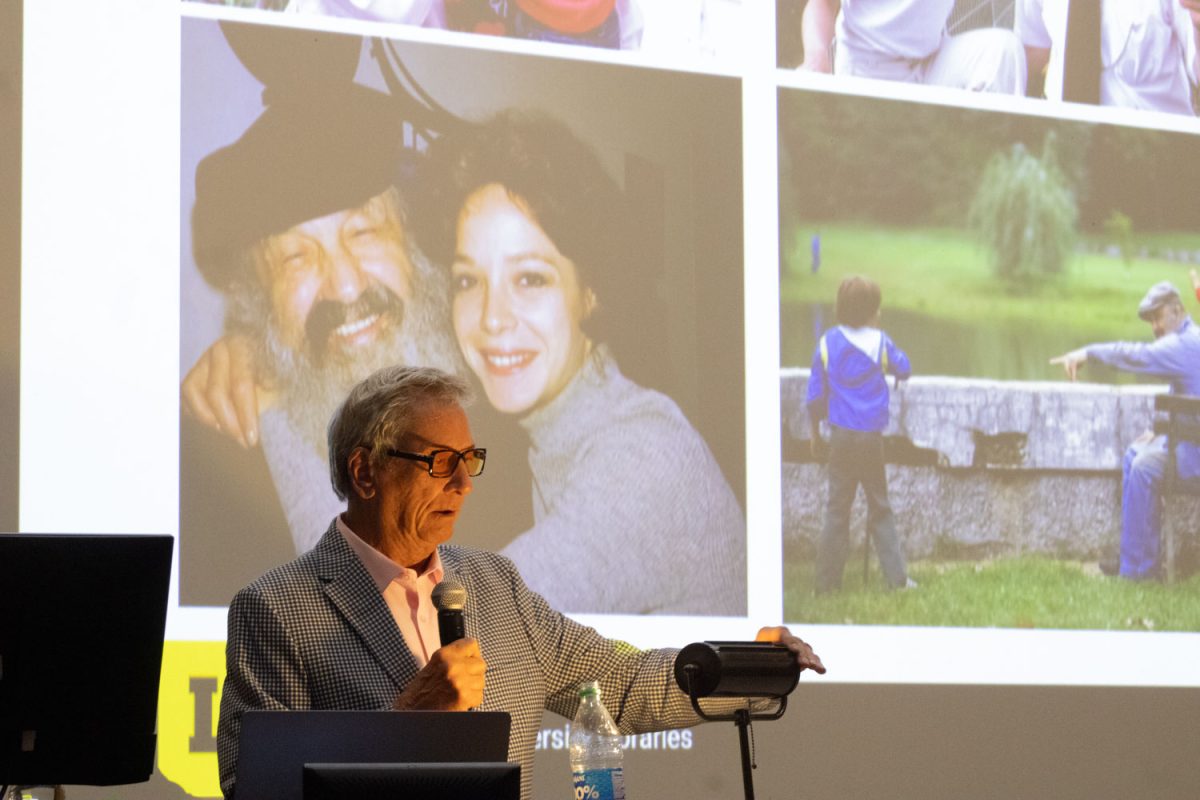After a night of nursing champagne, Barry Morrow woke up to the phone ringing. On the other end, Bill Sackter reminded Morrow that he had, drunkenly, promised to pick Sackter up the next morning.
“So, I did,” recalled Morrow, who has since sworn off champagne for its sugar content and his subsequent hangover. Morrow drove around the city with Sackter passenger-side and quickly realized that Sackter’s perspective on the world differed from his.
“I marveled at his wide-eyed excitement about everything that passed our car,” Morrow said. “I remember thinking, ‘It’s easy to be with this guy.’”
After that drive, Morrow and Sackter were inseparable buddies.
During their time as friends, Morrow learned of the circumstances of Sackter’s upbringing.
Sackter, the youngest of three children, was born to Jewish-Ukrainian immigrant parents, Samuel and Mary Sackter, on April 13, 1913, in St. Paul, Minnesota. At 7 years old, after his first-grade teacher raised concerns to his mother about his intellectual capabilities, the Minnesota court committed Sackter to Faribault State School for the Feeble-Minded.
Sackter would remain institutionalized for the next 44 years. After his release in 1964, Sackter, who was never taught to read or write, was placed in a boarding house and forced to support himself through low-paying jobs.
When Sackter met Morrow, he was a pot scrubber at a country club in Minneapolis.
Sackter, nearing his 60s, had spent much of his life locked indoors after being deemed “uneducable” by the state. While Morrow had at first raised an eyebrow at Sackter’s unadulterated optimism, he quickly realized that Morrow’s rose-colored perspective was rare.
“I just felt like he was a teacher,” Morrow said, who had grown up comparatively normally in Austin, Minnesota, and attended St. Olaf College. “It was the fact that he was so enlivened by common life.”
After Morrow moved to Iowa City in 1970 with his wife, Bev Morrow, their two children, and Sackter, Morrow helped his buddy get a job making coffee at the University of Iowa’s School of Social Work.
RELATED: LibCon at Iowa City Public Library creates space for comic fans of all ages
In 1975, Tom Walz, the former director of the UI’s School of Social Work, renamed the space Wild Bill’s Coffee Shop. The space still exists in North Hall, though it has not served coffee since the COVID-19 pandemic.
Sackter’s story was so profound that Morrow later developed a screenplay for a TV movie about his life. “Bill,” starring Mickey Rooney as Sackter and Dennis Quaid as Morrow, premiered at Hancher Auditorium in 1981 — airing on CBS no more than a month later. It earned Rooney an Emmy for his performance, and Morrow an Emmy for his writing.
The film also received a Golden Globe for Best TV Film in 1982. Barry and Bev Morrow took Sackter to the acceptance ceremony.
Though Sackter passed away just a year later in 1983, his story holds permanence.
Jen Knights, the marketing and communications manager of Performing Arts at the UI’s College of Liberal Arts and Sciences, submitted a proposal in 2021 for an exhibit to honor Sackter’s life.
She managed the Wild Bill’s space from 2018-22. During this time, the coffee shop became a workshop and a classroom dedicated to teaching and understanding issues of social justice and the discrimination that marginalized groups face. Knights quickly grew to appreciate Sackter and his story despite never personally meeting him.
“It was a passion project,” Knights said. “The story is just so beautiful.”
Knights noted that the UI’s Main Library Gallery prioritizes exhibits that are “timely, important, relevant, and meaningful” and often platforms the stories of marginalized people, as seen in its 2022 exhibit, “Out & About: Queer Life in Iowa City,” which highlighted the local history of the LGBTQ+ community.
Knights’ proposal was selected in 2022. “Hey Buddy, I’m Bill,” has been on display in the gallery since Aug. 1 and will remain open to the public until Dec. 19.
Knights said Sackter’s story has made an impact on the way neurotypical people approach neurodivergent people, and she has seen this change reflected in the people around her. Her coworkers at the UI School of Social Work, for instance, started focusing on individuals with mental disabilities in their community after being educated by Sackter’s experiences.
The exhibit, named after Sackter’s trademark greeting upon meeting new people, showcases walls lined with aspects of his story. Upon entry, Sackter’s upbringing can be seen on the left side and is emotionally the hardest to read of the three walls. At the tail-end of the third wall on the right side sits the Golden Globe Award for “Bill.”
“I hope people walk away with the understanding that every person has a story that deserves to be told and that every person has the potential to love and be loved,” Knights said.
Additionally, there were blank notecards for attendees to fill out and pin to a corkboard on the wall adjacent to the Golden Globe case.
One card, from Julie Heidger, a professor in the UI’s College of Education, read, “I remember Bill when I attended the U of I Preschool program. He was always there with a smile and a wave. He loved to play for us!”
Filmmaker Lane Wyrick, who worked with Morrow on the 2008 documentary of Sackter’s life, “A Friend Indeed: The Bill Sackter Story,” said he felt as if he knew Sackter through the many interviews he conducted with those who knew him.
“Everyone has qualities that can easily be overlooked,” Wyrick said. “But if you look closer and extend a helping hand, or just ask, laugh, smile, you can make a friend.”



